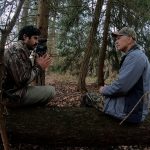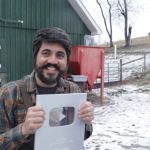Sometimes the most obvious way of solving a problem is not the best way.
On this episode of Homesteady, we explore our most valuable non-renewable resource: time. Beginning with the story of the Village on the Hill, we see that looking outside the box for a different solution may be the best way for us to achieve our goals. In part two of our ten part Homestead Business Series (miss part one? Listen here ) we head to North Idaho to meet Dan Ohmann on his grassfed homestead.
How did this police-officer-turned-stay-at-home-dad-and-farmer do it?
On the surface, we see a couple and a child living on a homestead raising lamb and pastured poultry. Dan’s spouse still works a traditional job in the software industry, and they gross approximately $2,250 from their meaty side hustle. Like so many of us, the arrival of his first child inspired Dan and his wife to escape their HOA-ruled suburb for something different.
Dan decided he needed to take a lot more responsibility for his resources-namely, food, and increasing food security and self-sufficiency.
(An aside-food security is an incredibly weighty and important topic. Learn more here.)
Dan’s explorations led him to the concept of permaculture. Designing sustainable systems using the natural resources that are available led him to Geoff Lawton’s work.
“The primary goal of permaculture is to provide a permanence of culture on the earth for people and all living things.”
-Geoff Lawton
So, what is permaculture, anyway? It is an amalgamation of social and agricultural systems that, like most things, is best defined by Wikipedia.
Dan experienced a paradigm shift in watching Geoff Lawton’s permaculture videos and taking his online permaculture course. Dan realized that like so many of us, he had designed his life according to the socially accepted success formula- good grades+ good college= good job, good money, good life. The permaculture model not only shifted Dan’s thinking about sustainable agriculture, but showed him that he could apply these same principles to design a lifestyle that deviated from the acceptable success formula. Why?
There has been a growing awareness though that firstly, there is the need to pay more attention to the peoplecare ethic, as it is often the dynamics of people that can interfere with projects, and secondly that the principles of permaculture can be used as effectively to create vibrant, healthy and productive people and communities as they have been in landscapes.
(Wikipedia 2018)
When Dan’s son ran into health problems that were directly related to his diet, that was the final push he needed to start figuring out how to provide what he needed for his family himself. They were able to make a big change, and leave their home in suburban Atlanta when his wife got a big promotion at work where she received a large pay raise and could work remotely.
Leaving the police force was a difficult transition for Dan. It was his entire career: he had worked his way through the ranks for many years. This was a meaningful job for Dan, with real value in serving his community, and he knew that he had continued career growth with his department. However, North Idaho was calling, with the land and lifestyle that Dan and his wife wanted for their family. After a two year search for the right property was finally completed, Dan started developing his homestead right away. Sheep were delivered less than 48 hours after move-in day, and they were off! Currently, they are in their second season of raising animals, with a focus on grassfed lamb.

How is Dan growing his business?
- Start small and with with people you know. Dan raised four lambs his first season. Sending strategic emails that resulted in a friend buying a half a lamb, Dan networked his way into selling two lambs, which left two for his family to eat.
- Make a marketing plan based upon on-the-ground feedback from your possible customer base. When Dan was marketing his lamb, everyone asked, “But how do you cook lamb?” With a series of YouTube cooking videos, he answered this question for his consumers. He developed these videos over the winter to share at a local food advocacy group event. In alignment with slow food principles, Dan showed his consumer where their food came from and what to do with it.
- Have reasonable growth expectations. Through word of mouth, Dan has sold six lambs and cut off sales. He has since been turning people away.
“I can’t meet the demand-yet,” says Dan.
Also- is the business profitable? Let’s get down to brass tacks, shall we? (What does that even mean, anyway?) Aust invokes the spirit of Accountant Mike to get down to the nitty gritty dollars-and-cents with Dan.
Through a value system that incorporates money as only ONE part of the value of an enterprise, however: is Dan’s homestead profitable?
Through a permaculture lens, yes. Despite challenges, Dan has built many different forms of capital into the value of his endeavor. Namely? Control over his life- specifically, his TIME. He values being able to schedule his work around his son. As parents, the truth of the matter is that we have to spend time on commutes, on working out of the home- time doing what I call “The Things” that take us away from our children. However, you ARE able to build your OWN system to optimize your opportunities for fulfillment.
Shout out to The Survival Podcast for inspiring the story of the village on the hill.
Thank you to our sponsor Freight Farms: grow food anywhere with the help of the Leafy Green Machine. Thanks for continuing to sponsor the podcast! Go to www.freightfarms.com/homesteady for access to a FREE Business planning guide!
Join our email list, and don’t miss any of the exciting updates we have coming up in 2018!
We have a new addition to the Pioneer Program: A PIONEER ONLY FORUM! Learn from one another and get to talk with Accountant Mike, The Foraging Beard, Dave from Northeast Edible, Alexia The Suburban Escapee, and Allyson, our producer. Our podcast guests will also be in the forums! Ask Dan any questions you may have in our forum. Not a Pioneer? Join today and get TWENTY bonus podcast episodes with just one click!
The wait will be shorter than ever for the next episode, as Aust is now creating Homesteady Content FULL TIME. What does that mean? A daily YouTube Video and a NEW podcast every two weeks.



Leave a Reply